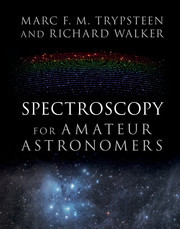Description
Spectroscopy for Amateur Astronomers
Recording, Processing, Analysis and Interpretation
Authors: Trypsteen Marc F. M., Walker Richard
This book presents the astrophysical concepts behind astronomical spectroscopy, covering both theoretical and practical elements.
Language: English
Subject for Spectroscopy for Amateur Astronomers:
Approximative price 59.89 €
In Print (Delivery period: 14 days).
Add to cart
Publication date: 07-2017
162 p. · 22.3x28.3 cm · Hardback
162 p. · 22.3x28.3 cm · Hardback
Description
/li>Contents
/li>Biography
/li>
This accessible guide presents the astrophysical concepts behind astronomical spectroscopy, covering both the theory and the practical elements of recording, processing, analysing and interpreting your spectra. It covers astronomical objects, such as stars, planets, nebulae, novae, supernovae, and events such as eclipses and comet passages. Suitable for anyone with only a little background knowledge and access to amateur-level equipment, the guide's many illustrations, sketches and figures will help you understand and practise this scientifically important and growing field of amateur astronomy, up to the level of Pro-Am collaborations. Accessible to non-academics, it benefits many groups from novices and learners in astronomy clubs, to advanced students and teachers of astrophysics. This volume is the perfect companion to the Spectral Atlas for Amateur Astronomers, which provides detailed commented spectral profiles of more than 100 astronomical objects.
Preface; Acknowledgements; 1. Physical basics of spectroscopy; 2. Electron transitions and formation of the spectra; 3. Quantum mechanical aspects of spectroscopy; 4. Types and function of dispersive elements; 5. Types and function of spectrographs; 6. Recording of the spectra; 7. Processing of recorded spectra; 8. Calibration of the spectra; 9. Analysis of the spectra; 10. Temperature and luminosity; 11. Expansion and contraction; 12. Rotation and orbital elements; 13. Gravity, abundance and magnetic fields; 14. Analysis of emission nebulae; 15. Amateurs and astronomical science.
Marc F. M. Trypsteen is a Belgian pharmacist and astronomer, with a background in analytical chemistry and spectroscopy. He has lectured on astronomical spectroscopy at university, high schools, observatories and astronomy clubs. He is co-founder of the Astro Event Group Belgium and also of the Astropolis Space Science Center in Ostend, where, in addition to outreach activities, he is responsible for the section on spectroscopy education and research.
Richard Walker spent his career in civil engineering, planning large projects such as power plants, dams and tunnels. Now retired, in the last ten years he has focused increasingly on stellar astronomy and on the indispensable key to this topic - spectroscopy. He undertook a large observing project to record and document the spectra of the most important astronomical objects, and chose to share this gathered information for the benefit of other amateurs worldwide.
Richard Walker spent his career in civil engineering, planning large projects such as power plants, dams and tunnels. Now retired, in the last ten years he has focused increasingly on stellar astronomy and on the indispensable key to this topic - spectroscopy. He undertook a large observing project to record and document the spectra of the most important astronomical objects, and chose to share this gathered information for the benefit of other amateurs worldwide.
© 2024 LAVOISIER S.A.S.

